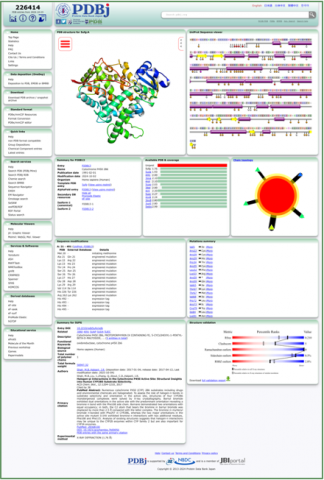![]()
ACHIEVEMENTSIPR The University of Osaka
-

- ACHIEVEMENTS
- A new portal integrating genome variants and protein structures
Press Release
2024.10.31
A new portal integrating genome variants and protein structures
Will lead to further advancement of the elucidation of disease mechanisms and applications for precision medicine
The Protein Data Bank Japan (PDBj), operated by the Institute for Protein Research at Osaka University, and the Tohoku Medical Megabank Organization (ToMMo) at Tohoku University have jointly developed and launched a new portal as part of PDBj’s services (https://pdbj.org/uniprot/). This portal connects genetic variant data collected from the Tohoku Medical Megabank Project with corresponding protein sequence and structural information.

Fig.
A new portal integrating genome variants and protein sequence/structural data.
The portal not only provides links to genetic variants from the Japanese Multi Omics Reference Panel (jMorp), developed by ToMMo, but also includes a tool that facilitates easy visualization of these variants on the 3D structure of proteins. Mapping genetic variants to the 3D structure of proteins is typically a complex task, but this new portal significantly simplifies the process.
The portal compiles the 3D structures of proteins registered in the PDB based on their UniProt IDs. It ranks these structures using a scoring system that takes into account factors such as resolution and the coverage of UniProt amino acid sequences for which 3D structural data is available. This enables users to efficiently select and analyze the relevant structures.
In addition, the amino acid sequence panel includes labels indicating variant information from jMorp for each residue. The sequence panel is synchronized with the 3D structure panel, allowing users to immediately identify the location of the selected residues in the 3D structure. Additional panels provide graphical representations of interactions between the proteins and compounds or other proteins in the displayed structure.
Future plans include integrating variant information from databases beyond jMorp with the aim of evolving the portal into a comprehensive platform that seamlessly links protein sequence and 3D structure data.
“We believe that the newly-developed portal, which links protein sequences with 3D structures, will enable broad use of high-precision genetic variant data from jMorp focused on the Japanese population, thereby contributing to further advancements in medicine and drug discovery,” said Genji Kurisu, head of PDBj. “As the regional data center of the worldwide PDB, PDBj will continue to provide a robust information infrastructure for life science research. We will promote its use through collaborations with domestic and international databases like jMorp while enhancing the sophistication of our data.”
The portal is expected to assist in understanding and predicting the impact of genetic variants on protein structure and function, advancing the elucidation of disease mechanisms, the discovery of new therapeutic targets, and the development of new treatments, thereby driving the progress of precision medicine.
Summary: A new portal linking Japanese genetic variant information with protein sequence and structure date has been launched by Protein Data Bank Japan (PDBj) and Tohoku University Tohoku Medical Megabank Organization (ToMMo). The portal simplifies the mapping of genetic variants to 3D protein structures and includes tools for visualization and analysis. It aims to advance medicine and drug discovery, particularly in precision medicine.


